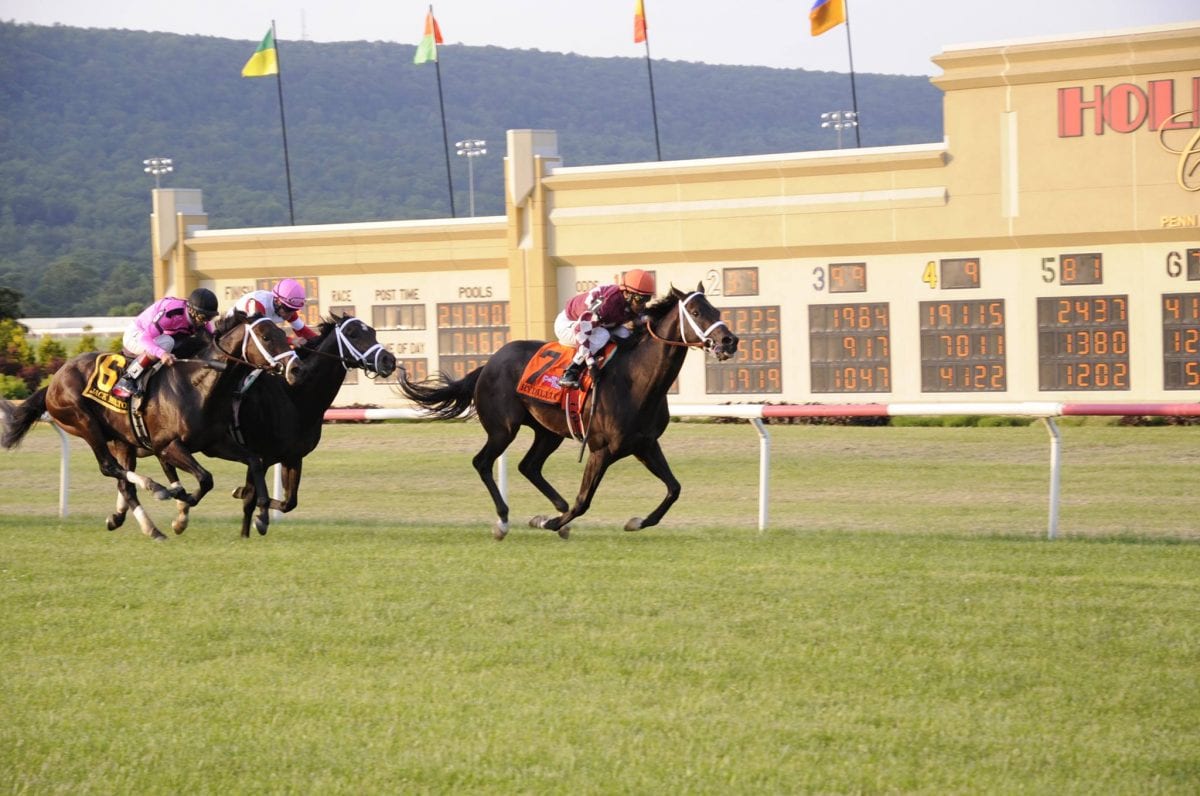by Jim Hague
The Pennsylvania state legislator who offered a proposal hat some horsemen believe would “eliminate the horse racing industry” said that support for the legislation is still “very strong” and that it will be officially introduced to the entire General Assembly when it convenes for budget meetings in June.
That’s in stark contrast to the message from horsemen, who describe the bill as “dead.”
Rep. Todd Stephens (R-151st District, just outside of Philadelphia) said last Thursday that his proposed legislation is still active.
“I don’t think it’s lost any steam at all,” said Stephens, who first spoke of the proposal two months ago. “It’s poised to be part of the discussion of the General Assembly in June.”
[pullquote]“I don’t think it’s lost any steam at all. It’s poised to be part of the discussion of the General Assembly in June.” — Rep. Todd Stephens[/pullquote]Stephens’ legislation would take substantially all of the money that the racing and breeding industries currently receive from the slot machines at Pennsylvania race tracks and return it to the taxpayers in the form of property tax relief.
Currently, the state’s Race Horse Development Fund (RHDF) receives the equivalent of 18 percent of the revenue generated by slot machines at the racetrack casinos. That total is approximately $200-to-$250 million every year. That money is primarily used to increase race purses and to a lesser extent breeder awards, enticing outside owners to bring their horses to race in Pennsylvania and encouraging horse owners to breed within the state.
But Stephens’ proposal would take $250 million from the RHDF to a newly created Local Effort Equalization Fund (LEEF). That fund in essence would direct money to school districts that receive less than 35 percent of their funding from the state.
“It’s meant to reduce property taxes, which in turn would fund education,” Stephens said. “I think it would be unfortunate if it didn’t get introduced (in June).”
Stephens said that he didn’t think the state had to worry about whether the horse racing industry would thrive or even survive.
“Is it appropriate for government to make sure the horse racing industry thrives?” Stephens said. “The pet rock industry doesn’t exist anymore. But we didn’t put $250 million into quarries to help the pet rock industry. It would be great to have that money to help quarries and quarry workers, delivery trucks, shipping and the rest. I don’t know what role government should be playing in helping horse racing.”
[pullquote]“The pet rock industry doesn’t exist anymore. But we didn’t put $250 million into quarries to help the pet rock industry.” — Rep. Todd Stephens[/pullquote]Todd Mostoller, the executive director of the Pennsylvania Horsemen’s Benevolent and Protective Association (HBPA), which represents horsemen at both Penn National and Presque Isle Downs, believes that if Stephens’ proposal becomes law, it would spell the end of horse racing in the state.
“We’ll just pack up and go home,” Mostoller said. “There would be no horse racing industry. It’s that simple.”
But Mostoller believes that the Pennsylvania General Assembly will kill Stephens’ proposal.
“It hasn’t had a supporter for quite a while,” Mostoller said. “There isn’t a state legislator who doesn’t understand what the horse racing industry means to the entire state economy. It was clear that he (Stephens) was not a supporter, but after he explained the facts, I don’t think he’s changed any minds. People are going to have their philosophical differences. We’ve done our best to prove to people what racing means to the Commonwealth of Pennsylvania. It’s only human nature.”
Mostoller is confident that the proposal will never see the floor of the General Assembly.
“It’s dead,” Mostoller said. “It’s not going to happen. There are no legs for it.”
Mostoller believes that Stephens is driven by politics.
“It’s an election year,” Mostoller said. “So he’s bound to do something a little irrational. It was clear from the start that there was no juice for it. He goes on TV, goes to the press and says what he feels. But the reality is that it’s not going to happen. I think there’s a lack of support in both directions. I’m not going to say that there are no worries, but is the support substantial? I’d say no.”
[pullquote]“It’s an election year. So he’s bound to do something a little irrational.” — Todd Mostoller, Pa. HBPA[/pullquote]Stephens has a problem with the “way the money (the RHDF) is given out.”
“It’s a huge problem, because some of these horsemen organizations are not from Pennsylvania,” Stephens said. “Over the years, we’ve pumped $1.8 billion into the horse racing industry, then it’s government’s fault because you can’t survive? The bottom line is that if you’re offering a product or service that the public wants, then it will stay in business like any other. I just think a quarter billion dollars can be money better spent in another way.”
Stephens said that his proposal has support “from all over the state.”
“The rural areas, the urban areas, all over,” Stephens said. “We have to do what’s right for the taxpayers. I think the discussion that will take place in Harrisburg in June will at the very least provide greater accountability for the way these funds are spent. We ought to see how the taxpayers’ money is being spent and who is truly benefitting from these programs.”
The most that slots have provided to the RHDF in a single year is $263 million, and Stephens estimates that the RHDF will receive $245 million from slots in the current fiscal year, meaning that, were his proposal enacted, it would effectively zero out the RHDF. In 2013, for the first year since casinos were introduced in, the total amount wagered on Pennsylvania slot machines declined.
(Featured image, of last year’s Penn Mile, by B & D Photography.)








